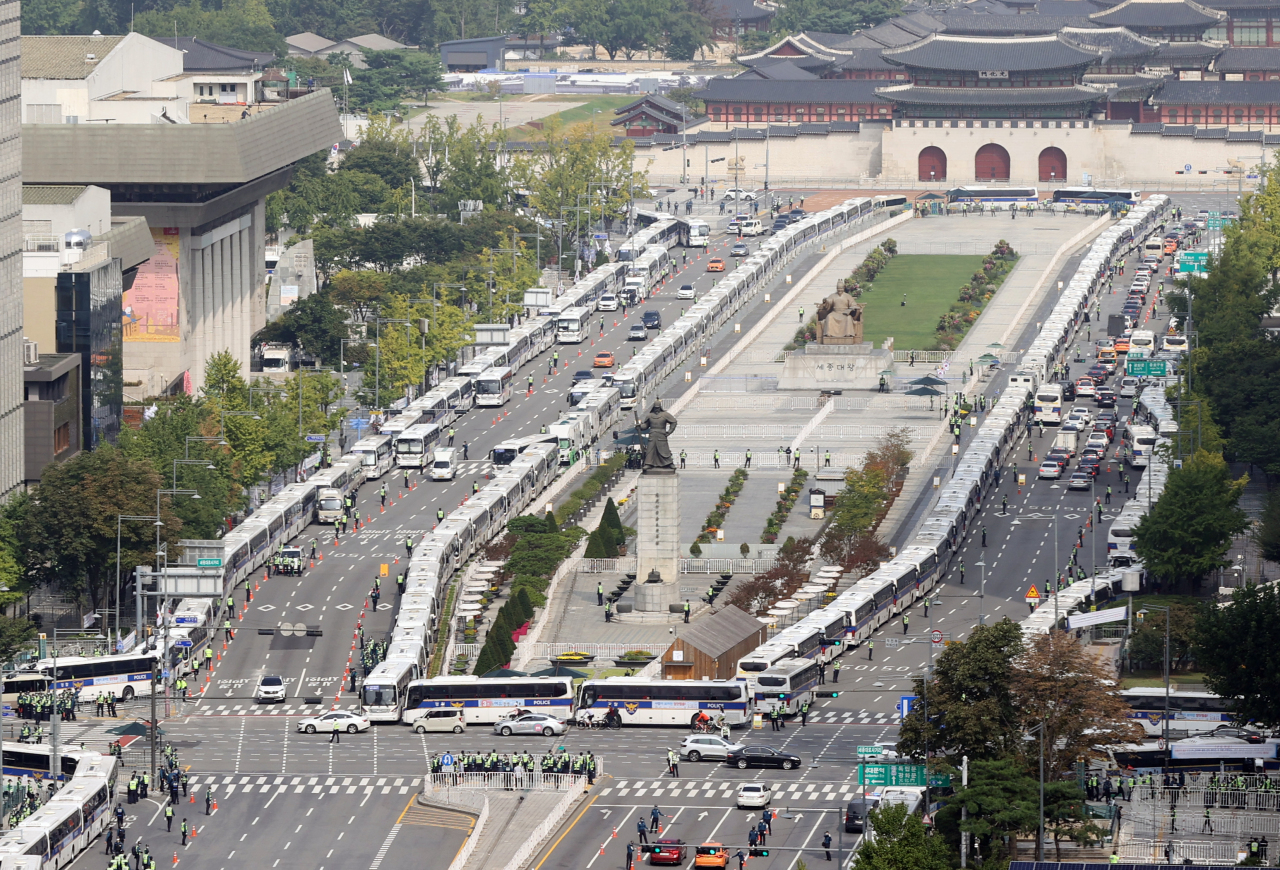Police response to anti-Moon protest sparks controversy
By Kim ArinPublished : Oct. 5, 2020 - 18:14

Police response to Saturday’s anti-Moon Jae-in “drive-thru” protests staged by conservative groups has prompted criticism that it may amount to an abuse of power.
On Saturday, the roads leading to Seoul’s central Gwanghwamun area, where protesters’ were set to drive by, were barricaded by police buses. Around 90 checkpoints were set up in addition to inspect passersby. Over 11,000 police officers in total were mobilized to control the protests throughout the day.
The Seoul Metropolitan Government warned Monday that another set of protests slated for Friday will be “blocked altogether.” “The Seoul office will work with the city police to stop protests from taking place,” said a senior official.
Following the city announcement, conservative civic group Freedom Union’s official Kim Sang-jin said over the phone that while the group had initially planned two concurrent protests -- one near the Gwanghwamun boulevard and another opposite an anti-Japan rally in front of the Japanese Embassy -- on Friday, they were now “not likely to happen.”
“If the government ban on protests remains valid until then, we are not going to go through with it,” he said. Under local laws, all assemblies must be declared to the district police in charge at least 48 hours in advance.
Kim said while he “has no objections to coronavirus rules,” he feels that “the police clampdown on protests are biased and based on partisan motives.” “Only those of anti-Moon administration nature are primarily targeted,” he said.
Among some 56 protests declared to the police as of 11 a.m. Monday were ones organized by the Korean Confederation of Trade Unions and the People’s Democracy Party.
The National Police Agency’s Commissioner General Kim Chang-yong said in a press briefing in the morning that unless there are revisions to existing administrative orders, “surveillance of similar strength” will be maintained for any upcoming demonstrations.
Oh Yoon-sung, a police studies professor at Soonchunhyang University in Asan, South Chungcheong Province, said the “exercise of police authority holds symbolic significance in the eyes of the public, and should take an approach that minimizes the infringement of basic rights.”
“Creating a barricade with police vehicles and restricting citizen travel for a small-scale, peaceful car parade protest could fall outside the appropriate scope of police power,” he said.
Oh added that pressure from the government for more police action against protests was also worrisome. “Police ought to stay neutral to political influences,” he said.
In August, Moon told Seoul officials to “bar protests where necessary” and “seek police assistance should city efforts fall short.”
“Let it be clear that public forces are well and alive,” he said.
Ruling Democratic Party of Korea Chairman Lee Nak-yon dropped by the Seoul Metropolitan Police Agency on Friday -- a day before the drive-thru rally in Gwanghwamun -- during which he reiterated the president’s message. “Give people an assurance that public forces are still kicking,” he told police.
“Due to the court’s decision, it looks like there’s going to be a bit of a risk,” said the former prime minister, referring to a Seoul court permit for the drive-by demonstrations.
After Lee’s visit to the capital police agency, a petition calling to impeach the Seoul court’s chief justice who granted the protest was posted on the presidential office’s website. The petition had attracted over 70,000 signatures as of Monday morning.
Attorney Hur Yoon, spokesperson for the Korean Bar Association, said the court “is obliged to rule on the basis of constitutional values and principles” and that while the virus concerns are understandable, its permission “deserves respect.”
“If a protest is done in a form that is unlikely to lead to coronavirus spread, that is within the realm of civil liberties -- for which there appears little ground for a ban,” he said.
Organizers of unlawful assemblies can face up to two years in jail or a fine of up to 2 million won ($1,720), per the Infectious Disease Control and Prevention Act.
By Kim Arin (arin@heraldcorp.com)


![[Exclusive] Korean military set to ban iPhones over 'security' concerns](http://res.heraldm.com/phpwas/restmb_idxmake.php?idx=644&simg=/content/image/2024/04/23/20240423050599_0.jpg&u=20240423183955)
![[AtoZ into Korean mind] Humor in Korea: Navigating the line between what's funny and not](http://res.heraldm.com/phpwas/restmb_idxmake.php?idx=644&simg=/content/image/2024/04/22/20240422050642_0.jpg&u=)




![[Graphic News] 77% of young Koreans still financially dependent](http://res.heraldm.com/phpwas/restmb_idxmake.php?idx=644&simg=/content/image/2024/04/22/20240422050762_0.gif&u=)
![[Herald Interview] Why Toss invited hackers to penetrate its system](http://res.heraldm.com/phpwas/restmb_idxmake.php?idx=644&simg=/content/image/2024/04/22/20240422050569_0.jpg&u=20240422150649)





![[Exclusive] Korean military to ban iPhones over security issues](http://res.heraldm.com/phpwas/restmb_idxmake.php?idx=652&simg=/content/image/2024/04/23/20240423050599_0.jpg&u=20240423183955)



![[Today’s K-pop] Ateez confirms US tour details](http://res.heraldm.com/phpwas/restmb_idxmake.php?idx=642&simg=/content/image/2024/04/23/20240423050700_0.jpg&u=)